
Your boss wanted that report yesterday. Your colleague requires your help with that project proposal, and you still have a pile of work to finish. In today’s fast-paced business landscape, riddled with constant distractions and increasing demands, boosting employee productivity is a top priority for organisations that want immediate and outstanding results.
A productive workforce does not just get things done; it does so efficiently and effectively, creating a ripple effect that can significantly impact an organisation’s growth and success. In other words, we should not just execute but optimise our efforts to accomplish our tasks in the least time-consuming manner.
Since members of the workforce are now spending more of their time working than sleeping and eating combined, it’s essential to get a grip on productivity to further increase output with minimal effort, time, and energy. So, dive into these 7 expert tips to supercharge your team’s performance and bring your business to new heights.
1. Prioritise tasks
Got a lot of work, but have no idea where to start? Use techniques like the Eisenhower Matrix that categorises tasks into 4 quadrants based on urgency and importance. This way, you can prioritise important and urgent tasks and delegate or eliminate less critical ones.
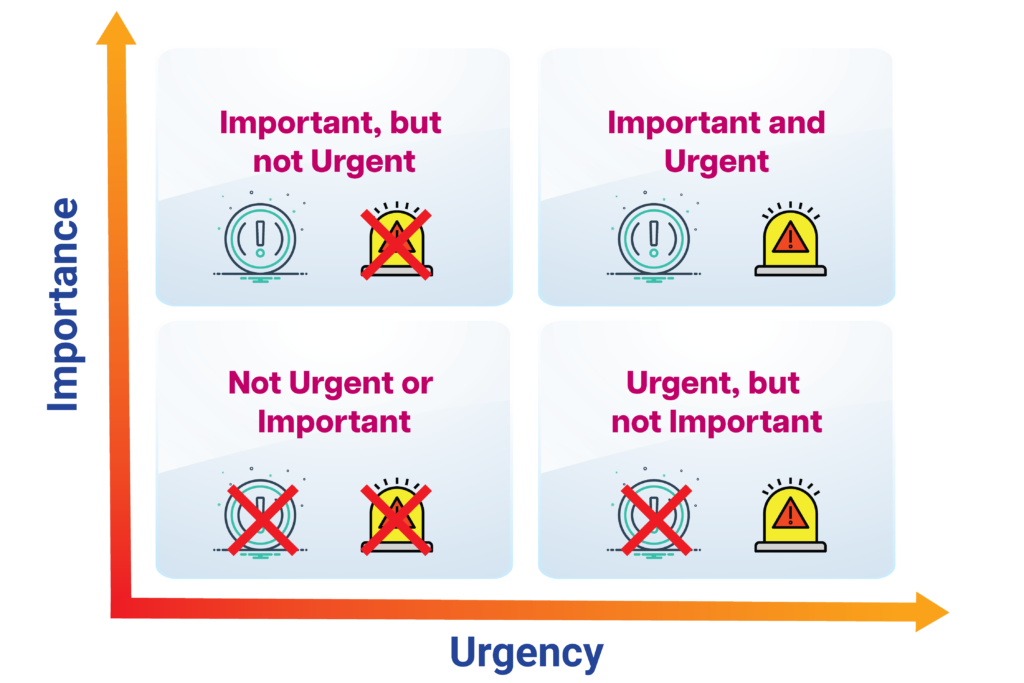
Another technique is the IVY Lee Method1, which helps you list down the 6 most important tasks you must work on tomorrow. Arrange them by importance and urgency. When tomorrow comes, work exclusively on the first task. Once it’s done, move on to the second item on your list. Whichever items you couldn’t accomplish on the day should go into the next day’s list and so on.
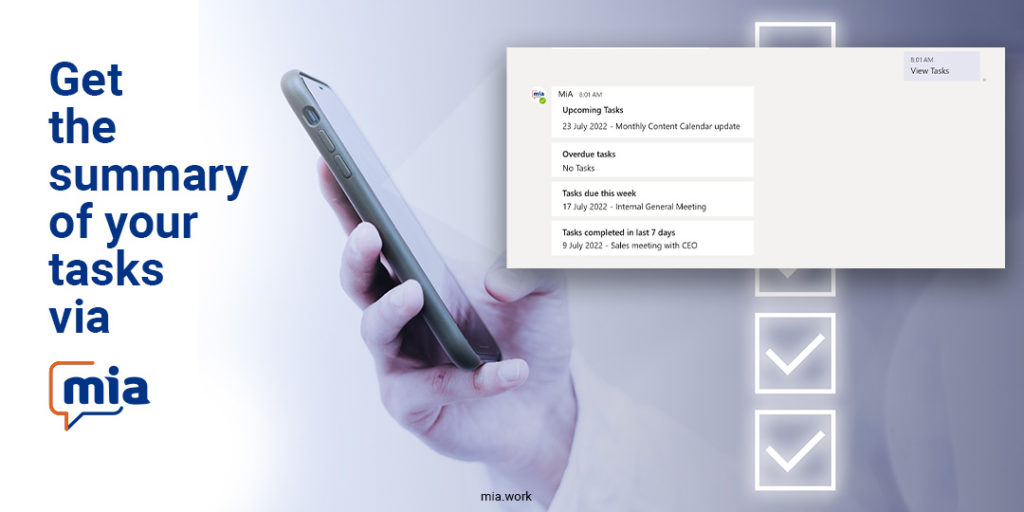
Tip #1: Use tools like Microsoft Tasks by Planner to note down your
to-do list & get daily reminders of your upcoming tasks through our workplace assistant integration, MiA for Microsoft Teams. This way, you will never miss out on important tasks.
2. Do it in 2 minutes
The 2-minute rule2 simply states that if something takes 2 minutes or less, then do it right away. Don’t overthink or do it later. Just get it done. It’s all about being efficient. Which is easier and faster: Calling back a client or adding it to your to-do list only to review and remind yourself of it later? Here’s a list of 2-minute tasks you can do right now:
- Checking in & out of work
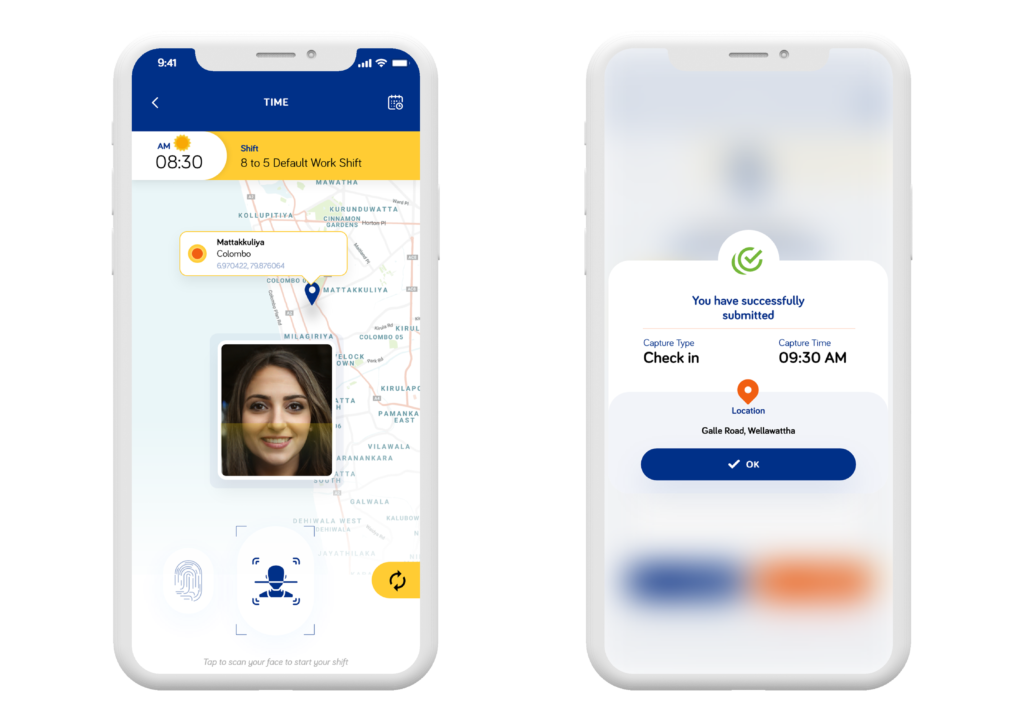
- Saving a contact to your phone
- Replying to an email
- Sending a document to your colleague
- Asking ChatGPT to write a business proposal
3. Get away from distractions & unproductive activities
With the inflow of emails, meetings, and notifications, it’s almost impossible to get any creative and strategic work done. One report3 revealed that employees using Microsoft 365 applications typically spend about 57% of their time on communication activities (like meetings, email & chat), while the remaining 43% is dedicated to tasks involving content creation, such as documents and presentations.
that an average employee deals with 56 daily interruptions? What’s worse is that they also spend 2 hours of wasted time recovering from those distractions.
Here’s what you can do:
- List down all your disruptors & restructure your day.
- Before you schedule a meeting, ask yourself if a meeting is required. Could it possibly be said over an email, call or chat?
- Ask your colleagues if you’re required for their meeting & politely request for the meeting to be recorded.
- Get the meeting agenda beforehand & stick to it.
- Allocate specific times for checking & responding to emails & chats.
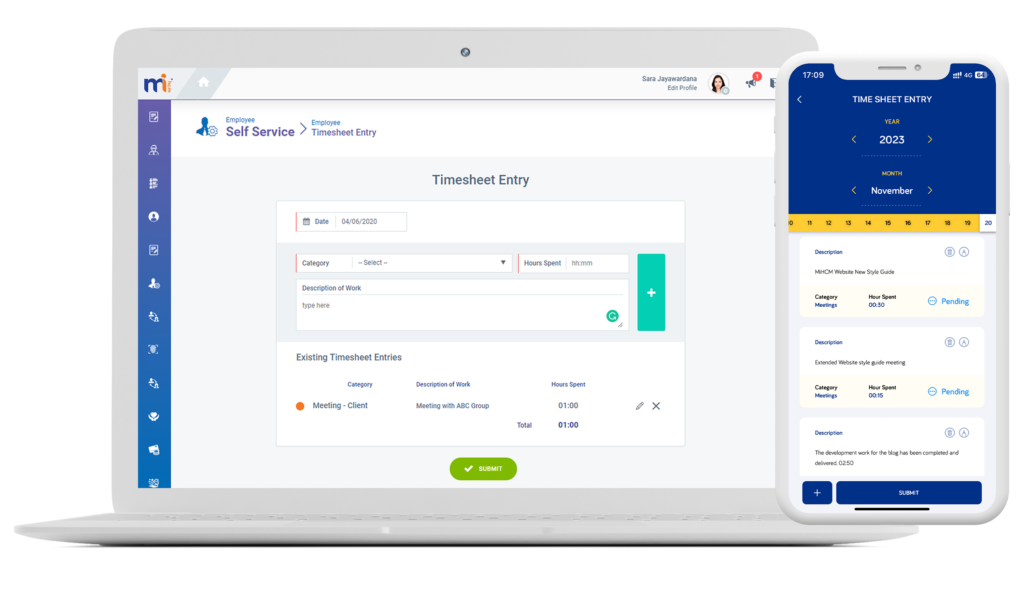
Tip #2: Using MiHCM, you can record your work activities & check your team’s daily timesheets to see how much time was spent on different tasks. Deep dive into our workforce productivity analytics & get the bigger picture from company-wise, all the way down to the employee.
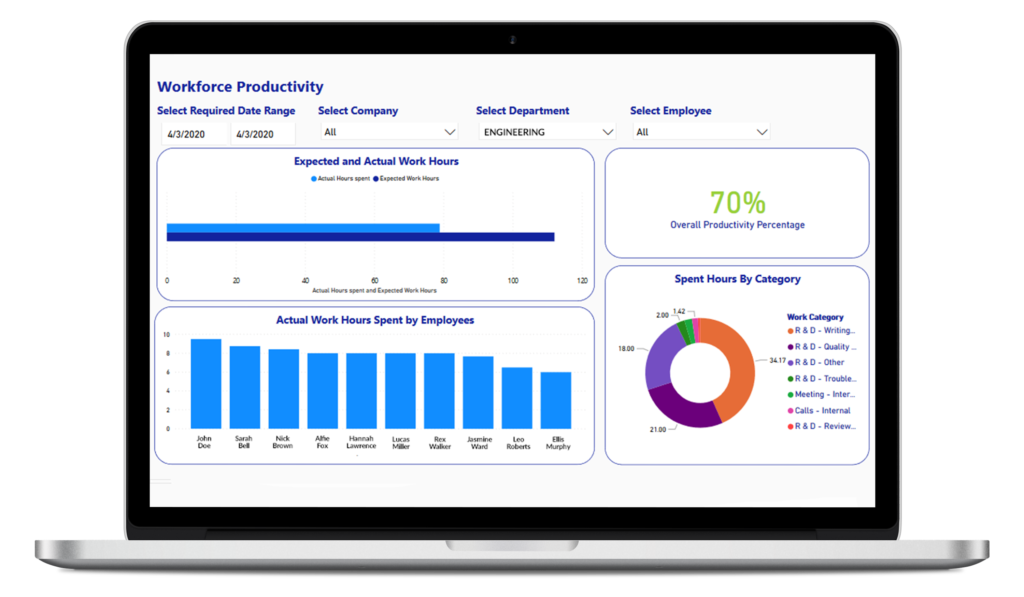
4. Block your time every day
No one is productive throughout the day. Productivity comes in bursts. Understanding our productive times and working accordingly is important to maximizing our outputs.
If you are more productive in the morning between 7 and 9 a.m., schedule an uninterrupted focus time (go on & put the Do Not Disturb status on) and ensure no meetings are allocated at that time. Sometimes, it’s not easy to turn down a meeting request, especially when it comes from your boss, but whenever possible saying ‘No’ won’t hurt you.
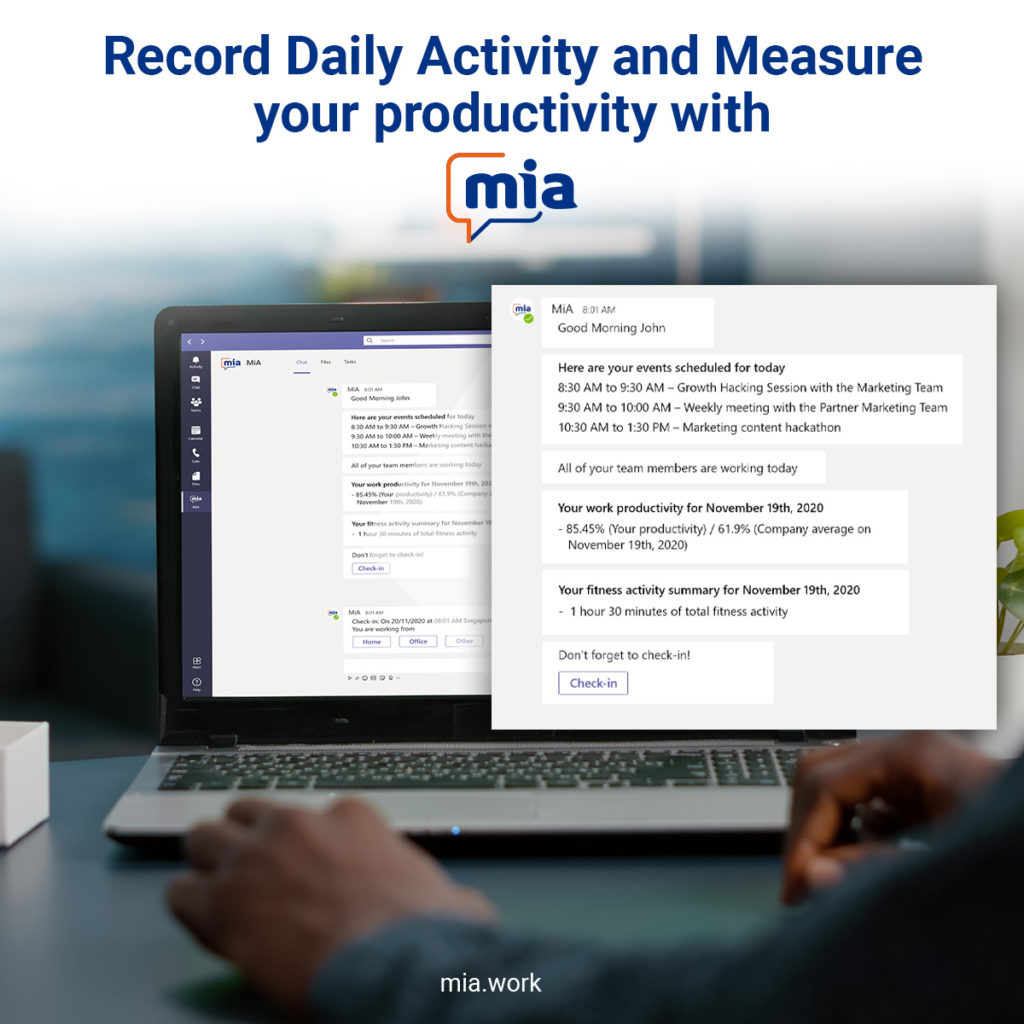
Tip #3: With our MiA for Microsoft Teams integration, every time you add a meeting or block your time, it gets captured in your daily timesheet on the MiHCM, Digital HR system.
5. Delegate your work to AI
It’s an interesting time to be alive where we no longer have to pull out our hair battling time, finding information, and drafting content. With interesting AI models, such as ChatGPT, Copilot and Bard, you can now delegate your email writing, presentation building, summarising, and proofreading to models and bots who will do the work for you.
According to Microsoft, around 79% of people have no problem using AI to do analytical work and 73% to do creative work. Interestingly, when asked to imagine work in 2030, many people valued saving time as an important use of AI.
Tip #4: Our Ask Mia feature powered by ChatGPT can help provide you with authorised internal business-related information, such as client information & even help you draft specific emails using your internal knowledge base.
6. Build employee engagement
Happy, enthusiastic, and committed employees truly help your business. They are the ones who constantly come up with new ideas and are bold enough to create new pathways for business growth.
Build engagement by encouraging, motivating, and recognising your people and peers. Have fun team-building sessions like scavenger hunts or even a karaoke night. Spend time with them. Acknowledge them. Help them. Value them.
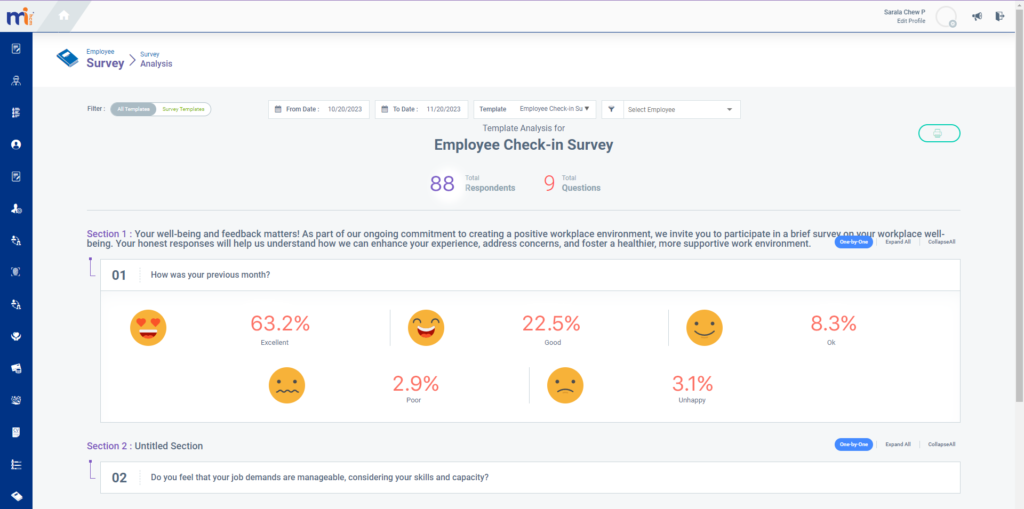
Tip #5: Are you listening to your employees well? MiHCM can help you cut through the noise. Use our exciting pulse survey feature to understand your employees better. Analyse the answers & get an overall view of your employees’ thoughts.
7. Provide training & development
Upskilling yourself and your employees is vital for the future of business. The world is changing at a rapid pace and keeping up with all the latest technological advances means that we must be updated ourselves. We must embrace everything new and learn continuously.
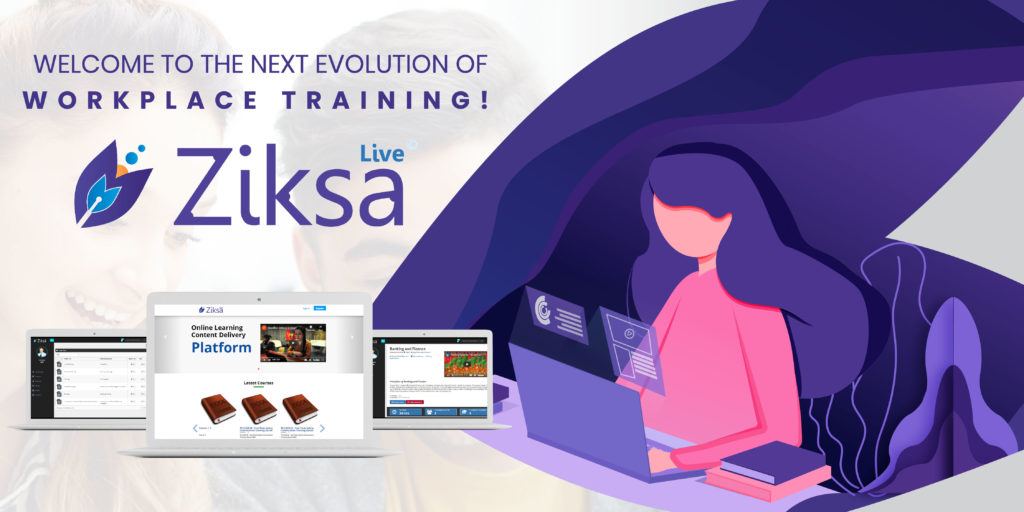
Tip #6: Using Ziksa, our learning delivery platform, you can provide on-demand training resources to your employees with video, audio, text & quiz content. Create an engaging learning experience & help your employees ace their courses.
- The Ivy Lee Method: The Daily Routine Experts Recommend for Peak Productivity: https://jamesclear.com/ivy-lee
- The Two-Minute Rule: https://gettingthingsdone.com/2020/05/the-two-minute-rule-2/
- Will AI Fix Work? 2023 Work Trend Index: Annual Report: https://www.microsoft.com/en-us/worklab/work-trend-index/will-ai-fix-work
- Time Wasting at Work: https://www.atlassian.com/time-wasting-at-work-infographic
